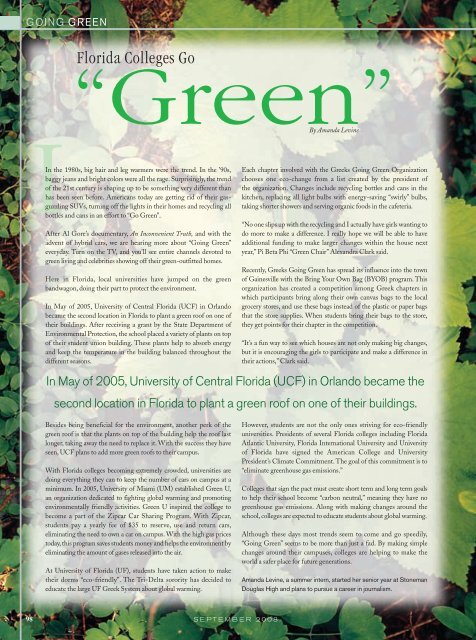September 2008 - The Parklander Magazine
September 2008 - The Parklander Magazine
September 2008 - The Parklander Magazine
You also want an ePaper? Increase the reach of your titles
YUMPU automatically turns print PDFs into web optimized ePapers that Google loves.
GOING GREEN<br />
Florida Colleges Go<br />
“Green”<br />
By Amanda Levine<br />
In the 1980s, big hair and leg warmers were the trend. In the ’90s,<br />
baggy jeans and bright colors were all the rage. Surprisingly, the trend<br />
of the 21st century is shaping up to be something very different than<br />
has been seen before. Americans today are getting rid of their gasguzzling<br />
SUVs, turning off the lights in their homes and recycling all<br />
bottles and cans in an effort to “Go Green”.<br />
After Al Gore’s documentary, An Inconvenient Truth, and with the<br />
advent of hybrid cars, we are hearing more about “Going Green”<br />
everyday. Turn on the TV, and you’ll see entire channels devoted to<br />
green living and celebrities showing off their green-outfitted homes.<br />
Here in Florida, local universities have jumped on the green<br />
bandwagon, doing their part to protect the environment.<br />
In May of 2005, University of Central Florida (UCF) in Orlando<br />
became the second location in Florida to plant a green roof on one of<br />
their buildings. After receiving a grant by the State Department of<br />
Environmental Protection, the school placed a variety of plants on top<br />
of their student union building. <strong>The</strong>se plants help to absorb energy<br />
and keep the temperature in the building balanced throughout the<br />
different seasons.<br />
Each chapter involved with the Greeks Going Green Organization<br />
chooses one eco-change from a list created by the president of<br />
the organization. Changes include recycling bottles and cans in the<br />
kitchen, replacing all light bulbs with energy-saving “swirly” bulbs,<br />
taking shorter showers and serving organic foods in the cafeteria.<br />
“No one slips up with the recycling and I actually have girls wanting to<br />
do more to make a difference. I really hope we will be able to have<br />
additional funding to make larger changes within the house next<br />
year,” Pi Beta Phi “Green Chair” Alexandra Clark said.<br />
Recently, Greeks Going Green has spread its influence into the town<br />
of Gainesville with the Bring Your Own Bag (BYOB) program. This<br />
organization has created a competition among Greek chapters in<br />
which participants bring along their own canvas bags to the local<br />
grocery stores, and use these bags instead of the plastic or paper bags<br />
that the store supplies. When students bring their bags to the store,<br />
they get points for their chapter in the competition.<br />
“It’s a fun way to see which houses are not only making big changes,<br />
but it is encouraging the girls to participate and make a difference in<br />
their actions,” Clark said.<br />
In May of 2005, University of Central Florida (UCF) in Orlando became the<br />
second location in Florida to plant a green roof on one of their buildings.<br />
Besides being beneficial for the environment, another perk of the<br />
green roof is that the plants on top of the building help the roof last<br />
longer, taking away the need to replace it. With the success they have<br />
seen, UCF plans to add more green roofs to their campus.<br />
With Florida colleges becoming extremely crowded, universities are<br />
doing everything they can to keep the number of cars on campus at a<br />
minimum. In 2005, University of Miami (UM) established Green U,<br />
an organization dedicated to fighting global warming and promoting<br />
environmentally friendly activities. Green U inspired the college to<br />
become a part of the Zipcar Car Sharing Program. With Zipcar,<br />
students pay a yearly fee of $35 to reserve, use and return cars,<br />
eliminating the need to own a car on campus. With the high gas prices<br />
today, this program saves students money and helps the environment by<br />
eliminating the amount of gases released into the air.<br />
At University of Florida (UF), students have taken action to make<br />
their dorms “eco-friendly”. <strong>The</strong> Tri-Delta sorority has decided to<br />
educate the large UF Greek System about global warming.<br />
However, students are not the only ones striving for eco-friendly<br />
universities. Presidents of several Florida colleges including Florida<br />
Atlantic University, Florida International University and University<br />
of Florida have signed the American College and University<br />
President’s Climate Commitment. <strong>The</strong> goal of this commitment is to<br />
“eliminate greenhouse gas emissions.”<br />
Colleges that sign the pact must create short term and long term goals<br />
to help their school become “carbon neutral,” meaning they have no<br />
greenhouse gas emissions. Along with making changes around the<br />
school, colleges are expected to educate students about global warming.<br />
Although these days most trends seem to come and go speedily,<br />
“Going Green” seems to be more than just a fad. By making simple<br />
changes around their campuses, colleges are helping to make the<br />
world a safer place for future generations.<br />
Amanda Levine, a summer intern, started her senior year at Stoneman<br />
Douglas High and plans to pursue a career in journalism.<br />
98 SEPTEMBER <strong>2008</strong>
















